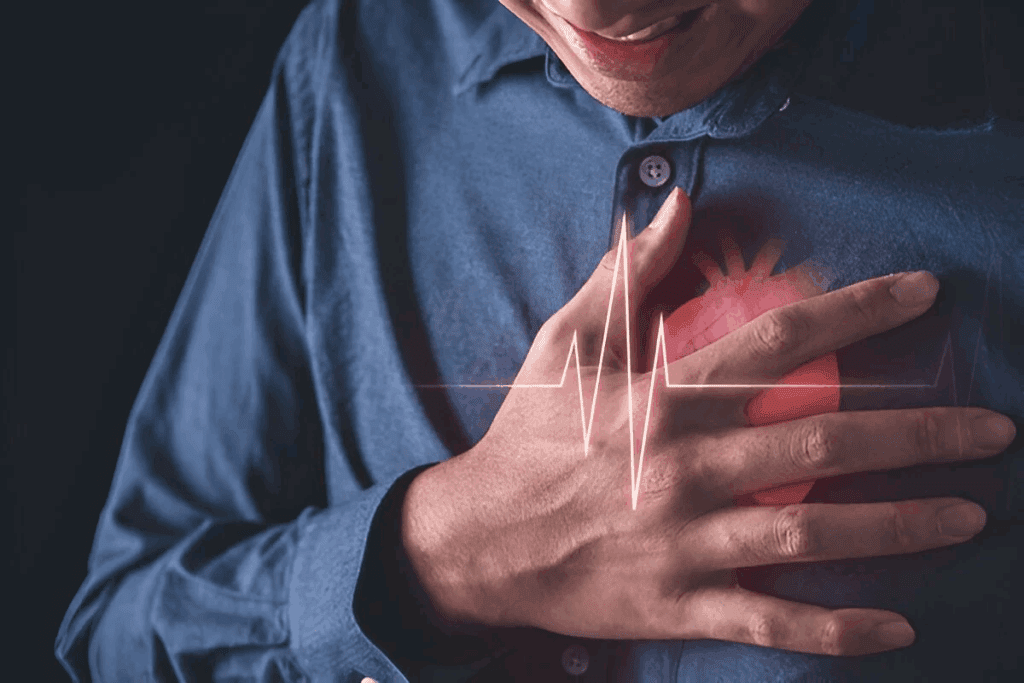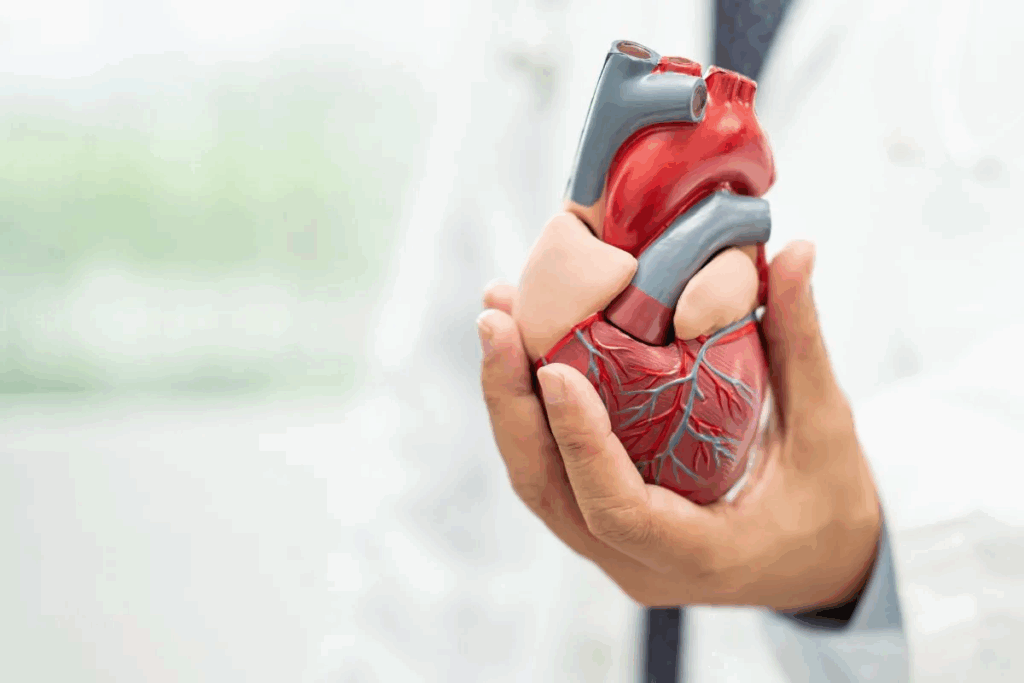Last Updated on November 25, 2025 by Ugurkan Demir

The term cardiovascular refers to the heart (cardio) and blood vessels (vascular). It’s the system that moves blood around our bodies.
At Liv Hospital, we think it’s key to know about cardiovascular health. The word “cardi” comes from the Greek “kardia,” which means “heart.” It’s the root of many medical terms about heart health.
The cardiovascular system is vital. It brings nutrients and oxygen to us and takes away waste. Knowing about cardiovascular health is important for staying healthy and preventing diseases. Understanding what does cardiovascular mean helps us see how this system keeps our body working properly.

To understand “cardiovascular,” we must break it down. It combines “cardio” and “vascular.” Knowing these parts helps us get the whole picture.
The word “cardio” comes from the Greek “kardia,” meaning heart. “Vascular” comes from Latin “vasculum,” meaning small vessel. So, “cardiovascular” means related to the heart and blood vessels.
When we talk about “cardiovascular,” we’re talking about the heart and blood vessels. This includes the heart, arteries, veins, and capillaries. They all work together to keep our blood flowing.
The right way to spell “cardiovascular” is c-a-r-d-i-o-v-a-s-c-u-l-a-r. Dictionaries like Merriam-Webster and Cambridge Dictionary agree on this. Getting it right is key for clear communication, like in medical talks.
For instance, when we’re talking about heart health, spelling it right shows we’re serious. It’s used in medical terms, so spelling it correctly is very important.

To grasp cardiovascular health, we must first understand its meaning. The term “cardiovascular” comes from Greek words. “Kardia” means heart, and “vasculum” means small vessels. This helps us see what the term really means.
“Cardiovascular” literally means anything to do with the heart and blood vessels. This includes the heart and the arteries, veins, and capillaries. These vessels carry blood all over the body. They are key for delivering oxygen and nutrients and removing waste.
In everyday talk, “cardiovascular” often means exercise and health. For example, cardiovascular exercises are activities that make your heart rate go up. These include running, cycling, or swimming. People also talk about cardiovascular health when they discuss high blood pressure, heart disease, or the good effects of a healthy diet and exercise.
Knowing how “cardiovascular” is used in daily speech helps connect medical terms with everyday talk. It makes it simpler for people to talk about their health and fitness goals.
The word ‘cardiovascular’ comes from Greek and Latin roots. Knowing its origins helps us grasp its meaning in medicine and daily life.
The “cardio-” part comes from “kardia,” the Greek word for heart. This root is also found in terms like “cardiology” and “cardiomyopathy.” It shows how vital the heart is in our bodies and health.
The “-vascular” part comes from “vasculum,” a Latin word for small vessel. “Vasculum” is a smaller version of “vas,” which means vessel or container. In ‘cardiovascular,’ it refers to blood vessels like arteries, veins, and capillaries.
Together, ‘cardiovascular’ means it’s about the heart and blood vessels. This etymology helps us understand its use in medical terms and heart health talks.
Learning about ‘cardiovascular’ helps us see how the heart and blood vessels work together. It also shows why keeping our cardiovascular system healthy is so important.
It’s key to know the cardiovascular definition in a medical context. This term is closely tied to heart health and the blood vessels. These vessels carry blood all over the body.
In hospitals, “cardiovascular” means anything to do with the heart and blood vessels. This includes arteries, veins, and capillaries. They work together to move blood, bringing oxygen and nutrients to our bodies and taking away waste.
Medical books and websites explain “cardiovascular” as heart and blood vessel health. They stress its role in finding and treating heart and blood vessel problems.
The common person might think “cardiovascular” just means heart health. But doctors use it to mean the whole circulatory system. This difference is important for correct diagnosis and treatment.
Doctors use “cardiovascular” with a detailed understanding of the heart and blood vessels. This exact meaning helps them give the right care.
Knowing how the cardiovascular system works is key to staying healthy. It’s made up of the heart and blood vessels. Together, they keep blood moving around the body.
The heart is a strong muscle that pumps blood everywhere. It has four chambers: the right and left atria, and the right and left ventricles. The atria catch blood coming back, and the ventricles send it out.
The heart’s job is to give the body oxygen and nutrients. It does this by pumping blood through blood vessels, which we’ll look at next.
Blood vessels are key for moving blood around the body. There are three main kinds: arteries, veins, and capillaries. Arteries carry blood with oxygen to the body, and veins bring blood back to the heart. Capillaries are the smallest and let oxygen, nutrients, and waste move between blood and tissues.
The circulatory pathway is the path blood takes through the body. It starts at the heart, where blood goes into arteries. Arteries split into smaller arterioles and then capillaries, where substances are exchanged.
Then, the blood goes into venules and bigger veins, back to the heart. This cycle is essential for the body’s health.
The cardiovascular system is key to our health, doing many important jobs. It carries nutrients and oxygen to our cells and takes away waste. These tasks are vital for life.
The cardiovascular system mainly transports nutrients and oxygen to our cells. This is essential for energy, growth, and fixing tissues. The heart sends oxygen-rich blood to the body, giving cells what they need to work well.
The cardiovascular system also helps get rid of waste. It carries deoxygenated blood with waste like carbon dioxide back to the lungs and excretory organs. This keeps our body’s environment healthy and balanced.
The cardiovascular system helps control body temperature and pH levels. It circulates blood to keep the body warm and stable. It also helps keep the body’s acid-base balance by moving buffers and removing extra hydrogen ions.
This system is vital for our body’s cells and organs to work right. We depend on it to stay healthy and feel good.
Looking into the language of heart health, we find terms like “cardiovascularly” and “cardiovascularity.” These words help us understand the heart and blood system’s condition and care.
The adverb “cardiovascularly” means something is done concerning the heart and blood vessels. It describes actions or states that impact heart health.
For example, someone who works out cardiovascularly is doing activities that boost heart health, like running or cycling.
“Cardiovascularity” is a noun that talks about the state of heart and blood health. It’s not often used in daily talk but shows up in medical or research settings. It describes the quality or status of someone’s heart and blood system.
| Term | Definition | Example Usage |
| Cardiovascularly | In a manner related to heart and blood vessels | She exercises cardiovascularly by swimming daily. |
| Cardiovascularity | State or condition of cardiovascular health | The study examined the cardiovascularity of the participants. |
Knowing about “cardiovascularly” and “cardiovascularity” helps us better understand heart health and its many facets.
Cardiovascular diseases are a major cause of death worldwide. This highlights the need for good prevention and treatment plans. We will look at common heart and blood vessel problems and their big impact globally.
Cardiovascular diseases include many heart and blood vessel issues. The top ones are coronary artery disease, heart failure, and stroke. Coronary artery disease happens when heart arteries get blocked or narrowed. Heart failure means the heart can’t pump enough blood. Stroke is when brain blood flow stops or slows, cutting off oxygen and nutrients.
The effect of cardiovascular diseases worldwide is huge. Health stats show they cause a lot of deaths every year. The World Health Organization (WHO) says they lead to over 17.9 million deaths annually.
| Region | Cardiovascular Disease Mortality Rate (per 100,000) |
| Global | 235.5 |
| Low-income Countries | 282.1 |
| High-income Countries | 174.6 |
We’ve covered key points about heart and blood vessel health and diseases. Knowing these details is key to fighting these diseases effectively.
Keeping our heart and blood vessels healthy is key to feeling good and living long. A strong heart and blood vessels are vital for our body’s needs. By living a healthy lifestyle and getting regular check-ups, we can lower heart disease risks.
Living a heart-healthy life involves several important steps. Diet is a big part; eating lots of fruits, veggies, whole grains, and lean meats helps keep blood pressure and cholesterol in check. Regular physical activity also strengthens the heart, boosts blood flow, and helps control weight.
Not smoking and drinking alcohol in moderation are also key. Quitting smoking greatly lowers heart disease risk. Drinking in moderation helps avoid too much heart strain.
Regular health checks are vital for catching heart risks early. Blood pressure checks and cholesterol level assessments help spot problems before they get worse. It’s smart to work with your doctor to create a prevention plan that fits you.
Also, screenings for diabetes and obesity are important. These conditions can harm the heart. By tackling these risks, we can stop more serious heart problems from happening.
By living a healthy lifestyle and taking preventive steps, we can keep our heart healthy and lower heart disease risk. It’s always a good time to make healthy choices.
Cardiovascular medicine has seen big leaps forward. New specialties and treatments have emerged for heart and blood vessel diseases. Cardiology and cardiovascular surgery are at the heart of these advances.
Cardiology deals with heart disorders. Cardiologists use tests like electrocardiograms and echocardiograms to find problems. On the other hand, cardiovascular surgery treats heart and blood vessel diseases with surgery.
Cardiologists and cardiovascular surgeons work together for the best care. Collaboration between cardiologists and cardiovascular surgeons is key for complex heart conditions.
“The integration of cardiology and cardiovascular surgery has revolutionized the treatment of cardiovascular diseases, providing patients with many effective options.”
Modern care uses new treatments and technologies. Some include:
These methods have greatly improved care and recovery times. For example, minimally invasive procedures cause less harm and lead to faster healing.
| Treatment Approach | Benefits |
| Minimally Invasive Surgery | Less trauma, quicker recovery |
| Advanced Imaging Technologies | More accurate diagnoses |
| Personalized Medicine | Tailored treatment plans |
Liv Hospital is dedicated to the latest in cardiovascular care. Our team works together for complete and caring care for our patients.
We aim for the best results by using the latest medical advancements and focusing on the patient. This approach helps those with cardiovascular conditions.
Advanced cardiovascular care services bring new hope to patients around the world. We aim to provide top-notch healthcare. We also offer full support for international patients.
Our services cover a wide range of treatments for heart conditions. These are available at top-notch treatment centers. They are equipped with the latest technology.
Specialized treatment centers focus on heart-related conditions. They have experienced cardiologists and surgeons. Together, they create personalized treatment plans.
Patients get access to many diagnostic and treatment options. This includes advanced imaging and minimally invasive surgeries. The goal is to improve patient outcomes effectively and efficiently.
Liv Hospital leads in advanced cardiovascular care. Our mission is to give world-class healthcare to international patients. We handle diagnosis, treatment, and management of heart conditions with the latest technology.
We provide full support to our patients, including language help and accommodations. This ensures a comfortable and stress-free experience. Our team works hard to achieve the best outcomes for our patients. We also offer emotional support and guidance during their treatment.
Our commitment to quality care shows in our facilities and team. We aim to be at the forefront of medical innovation. This way, our patients get the best treatment options.
Knowing what “cardiovascular” means is key to understanding heart health. This article has covered its definition, origins, and how doctors use it. It shows how vital it is for health and disease.
We looked at the heart system’s parts and what it does. It carries nutrients and oxygen, takes out waste, and keeps body temperature and pH balanced. Knowing this helps us see why heart health is so important.
In short, our summary stresses the need for a healthy lifestyle and screenings. It’s about working with doctors and places like Liv Hospital to get top-notch care. This way, we can support patients from around the world.
“Cardiovascular” refers to the heart and blood vessels. It’s key for moving blood around the body.
It’s spelled c-a-r-d-i-o-v-a-s-c-u-l-a-r.
It breaks down into “cardio” for the heart and “vascular” for blood vessels.
It comes from Greek “kardia” for heart and Latin “vasculum” for small vessel.
In medicine, it includes the heart, arteries, veins, and capillaries. It’s about blood circulation and health.
It carries nutrients and oxygen, removes waste, and controls body temperature and pH.
The adverbial form is “cardiovascularly.” It describes actions related to heart health.
It’s about having a healthy heart and blood system. Though not widely used in medicine.
Conditions include coronary artery disease, heart failure, and hypertension. Also, stroke is common.
Keep it healthy with a good diet, exercise, and screenings. These help catch problems early.
Cardiology and cardiovascular surgery treat heart diseases. They offer many treatments, from meds to surgery.
Services include specialized treatment centers. Places like Liv Hospital offer full care for international patients.
Subscribe to our e-newsletter to stay informed about the latest innovations in the world of health and exclusive offers!